Click Here to Download PDF Version
Telehealth Newsletter
Official Newsletter of Tamil Nadu Chapter of Telemedicine Society of India
| What is New?
Next month comes the annual meeting at Kochi and preparations are in full swing. This will hopefully be a good face to face meeting with some online components. The program is still not out there but we are sure it will be a very engaging program. This month we see the inauguration of Telemedicine Society of India’s J&K chapter. Wish the chapter all the very best. October has been a quiet month for telehealth with all the other festivities. The highlight of this issue is the work of our member Indiritta Indiritta Singh Dmello with a NGO called ‘Hospital Guide Foundation’ that works for upliftment of healthcare in remote locations. The COVID menace is not yet gone but we are learning how to live with the virus, do take your precautions when you travel for the conference. Thank You |
Hospital Guide Foundation – Working in Villages to Uplift Healthcare
Indiritta Singh Dmello
Director, Hospital Guide Foundation (An Oxford graduate in Politics, Philosophy & Economics with a PG Diploma in Medical Law & Ethics-National Law School, Bangalore)
Inspired by Gandhiji’s quote “The future of India lies in its villages” Hospital Guide Foundation (HGF) has been working towards strengthening India’s villages with a focus on rural health.
With the concentration of Doctors in the Urban areas and more than two-thirds of Indians living in villages, there is a huge shortage of Doctors in the rural areas. (A shortfall of 79.9% specialists) https://main.mohfw.gov.in/newshighlights-90
The major disease burden in India resides in Non-Communicable Diseases (NCDs) such as Heart and Lung diseases, Stroke, Cancer & Diabetes. Nearly 5.8 million people in India die due to NCDs making it a leading cause of deaths. The majority of premature NCD deaths are preventable. NCDs cause considerable loss in potentially productive years of life and hence inflicting a burden on the socio-economic development of India (Ref –https://www.wbhealth.gov.in/NCD/)
Hospital Guide Foundation (HGF) ensures comprehensive Quality Healthcare is accessible in the rural areas with a focus on Non-Communicable Diseases free of cost. It works with an effort to have a sustainable impact supported by Corporate Social Responsibility and is currently working in Western Uttar Pradesh, impacting masses of people annually and hoping to hit a million by 2025, by expanding to the entire state and then the entire country.
For effective last mile connectivity, HGF works with the Pradhans of the villages with a two-pronged strategy of spreading awareness followed by action. It uses Telemedicine as an enabler to address the gap where there is a lack of sufficient Doctors in the rural areas. To have a sustainable and successful Telemedicine program, HGF deploys a holistic approach with seamless processes and optimal technology hence achieving better results. It ensures tests, medicines, counseling is given (about the process, disease & treatment), right expectations are set, ensures compliance (tests, medicines & life style) and pro-active follow ups. Multiple touch points are managed seamlessly between patients, nurses, Doctors and telemedicine specialists for enabling a great healthcare experience against a harsh backdrop of poor infrastructure be it roads, electricity or internet. Hence optimal technology is deployed for a superior Doctor-Patient experience as the quality of communication has a direct impact on the diagnosis, prognosis and treatment.
Regular Health camps are conducted to drive awareness and reach the masses. Post the health camps, patients are linked to HGF’s telemedicine program to ensure continuum of care.
HGF’s focus on quality processes and alliances with the best institutes such as AIIMS, National Heart Institute, Sita Ram Bhartia Institute of Research & Sciences, Dr Dang’s Path lab has ensured that the best care is provided.
Being the most stringent form of an NGO (licensed by the Govt of India, Company U/S 8 for charitable purposes) only reinforces the core values it stands for – Ethics, Competence and Compassion. It has been featured by many prominent media houses like Economic Times, India Today, Hindu and internationally covered by BMJ Innovations (British Medical Journal). The Advisory Board comprises of stalwarts like Dr. M.C. Misra, Ex Director with AIIMS (appointed on HGF’s Advisory Board on approval of the Union Health Ministry while he was the Director) handholding HGF through all its processes to ensure quality delivery. The Director of HGF, Indiritta is an Oxford Graduate with a PG Diploma in Medical Law & Ethics from the National Law School, Bangalore, who works relentlessly towards achieving HGF’s dream of a Stronger Healthier Rural India.
A case study of HGF’s work featured in a top Medical Journal and a success letter from the Government of Uttar Pradesh is a testament to the quality of work being done on the ground. However, the truest and most rewarding testament is from the patients itself!

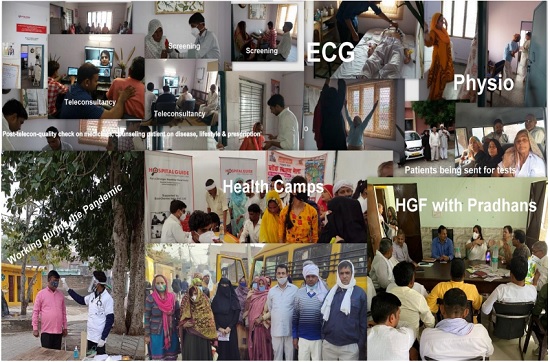
Curtain raiser Webinar for TELEMEDICON 2022
“Strengthening Health Systems through Sustainable Telemedicine and Digital Health”
in Association with Telemedicine Society of India Kerala Chapter, Amrita Hospitals & Journo Med
26 October, Wednesday, 8:30 PM
A curtain raiser webinar for TELEMEDICON 2022 was conducted at Amrita Hospitals with Telemedicine Society of India Kerala Chapter, on 26 October.
The theme was “Strengthening Health Systems through Sustainable Telemedicine and Digital Health”
With the significant increase in technological usage at all levels, Telemedicine and Medical Informatics are expected to grow at a considerable pace in the upcoming years, which enhances the growth of the MedTech space. . The significance of Telemedicon 2022 is to discuss the future of Telemedicine which holds immense potential in the healthcare sector. The pandemic catalyzed the pace and the growth dimension in the field of Telemedicine and digital health.
Topics Discussed
- How Remote Patient Monitoring is Changing the Healthcare Services
- How to Implement Telemedicine in Daily Practice
Expert Speakers
- Dr. Rajesh Pai, Chief Operating Officer, BMH Gimcare Hospital, Kannur
- Dr. Uma Shankar, Principal, Padmashree School of Public Health Bangalore, Managing Director – Med.Bot
Telemedicine Society of India (TSI) Maharashtra Chapter Organizes Annual Conference Mahatelemedicon 2022
The Maharashtra Chapter of TSI recently Organized Mahatelemedicon 2022-on 17 Sep 2022 in association with DY Patil Medical College and Research Centre (DYPMCH-Pimpri).
The conference was well attended and had unique highlights.
- Two credit points were awarded to participants by Maharashtra Medical Council.
- There was a poster and an essay competition on the theme My Idea of Telemedicine
- A Product Theatre on connected care devices was presented by Dr SV Kulkarni.
The conference was inaugurated by Dr Yashraj Patil Trustee and Treasurer DYPMCH-Pimpri Plenary Oration was by Dr Ganapathy on the topic- DIGITAL HEALTH IN 2030 : A PEEP INTO THE FUTURE.
Keynote addresses were given by Vimal Wakhlu and Dr Gaur Sundar. They spoke on AI in health care and Ayushman Bharat Digital Mission respectively.
Dr Bagmishika Puhan gave an excellent presentation on medicolegal aspects of telemedicine.
Dr Suchitra Mankar -current President of TSI-MH conducted a quiz on Telemedicine Guidelines in which there was very good audience participation.
The entire chapter worked and contributed to the success of the conference.
Notably, Constant guidance and mentorship was provided by Dr BS Ratta.
Dr JS Bhawalkar (Dean DYPMCH) provided immense support in venue and infrastructure.
Dr SV Kulkarni-President elect and Dr Prachee Sathe provided excellent liaison and sponsorship.
Dr Suchitra Mankar (President) and Dr Prashant Kulkarni (Organizing Secretary) planned and executed the entire conference efficiently and effectively.
TSI MH has been very active and dynamic in 2022. Besides Mahatelemedicon, an annual conference by a State Chapter, they have hosted many events like Telemedicine Quiz for all doctors of Pimpri Chinchwad and for Indian association of Occupational Health; Teleophthalmology Conference; Tele physiotherapy conference to name a few.
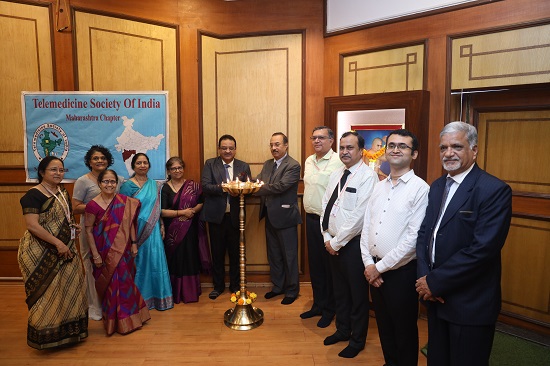
Lamp Lighting Ceremony
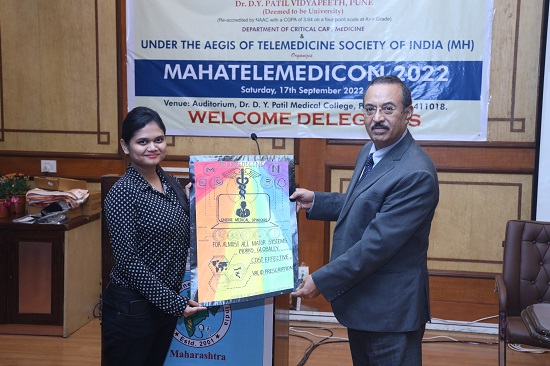
Dr Ratta felicitation the poster winner
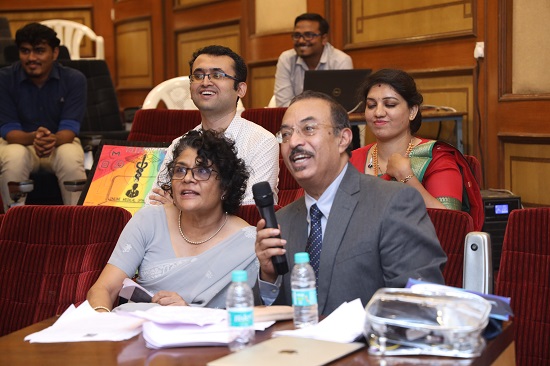
AI assisted model to predict bone repair outcomes for various fracture-treatment methods
-
AI-based simulation model can potentially help a surgeon choose the right implant or technique before a fracture-treatment surgery.
- Developed at Indian Institute of Technology Guwahati.
Researchers have developed Artificial Intelligence (AI) model to predict the healing of thigh bone fractures after surgery. The model developed by Dr. Souptick Chanda, Assistant Professor, Department of Biosciences and Bioengineering, IIT Guwahati, and his team can be used to assess the healing outcomes of different fracture fixation strategies so that an optimum strategy can be chosen for the patient depending on their personal physiologies and fracture type. Using such precision models can reduce the healing time, lighten the economic burden and pain for patients who need thigh fracture treatment.
The results of this research have recently been published in the open-source journal, PLoS One, in a paper co-authored by Dr. Souptick Chanda and his research scholar, Mr. Pratik Nag.
Speaking about the research, Dr. Souptick Chanda, Assistant Professor, Department of Biosciences and Bioengineering, IIT Guwahati, said, “AI has tremendous potential when it comes to understanding and predicting complex biological phenomena and hence, can play a big role in health sciences applications.”
The research team have used a combination of Finite Element Analysis and the AI tool, Fuzzy Logic to understand the healing process of fracture after various treatment methods. Various bone-growth parameters were used along with a rule-based simulation scheme for this purpose. The study further examined the influence of different screw fixation mechanisms to compare the fracture healing efficacies of each process. The predictions of healing made by the model agreed well with experimental observations, pointing to its reliability.
IIT Guwahati’s AI-based simulation model can potentially help a surgeon choose the right implant or technique before a fracture-treatment surgery. In addition to various biological and patient-specific parameters, the model can also account for different clinical phenomena, such as smoking, diabetes, etc. The model can also be adapted for veterinary fractures which are, physiologically and in various aspects, similar to those occurring in human patients.
The researchers plan to develop a software/app based on the algorithm that can be used in hospitals and other healthcare institutions as part of their fracture treatment protocols. The team is presently collaborating with Dr. Bhaskar Borgohain and his team of orthopaedists from the North Eastern Indira Gandhi Regional Institute of Health and Medical Sciences Hospital, Shillong, for animal studies to validate and fine-tune certain parameters.
Research done by IIT Guwahati researchers is useful because the incidences of thigh-bone and hip fractures have increased significantly due to the increasing geriatric population in the world. An estimated 2 lakh hip fractures occur every year in India alone, most of which require hospitalisation and trauma care. Treatment for hip fractures traditionally includes bone plates and rods to bridge the fracture site and promote bone healing. Fracture treatment methods are intuitively chosen by surgeons based on their experience, and there is no way of predicting the efficacy and success of the treatment method chosen. The research from IIT Guwahati will help increase the accuracy rate in decision-making in orthopaedics, thereby reducing the cost and disease burden associated with fracture recovery.
IIT Guwahati is working progressively in the field of medical technology and related fields. With the recent installation of Supercomputer facility PARAM KAMRUPA at the Institute, Artificial Intelligence, Data Science, and Deep Learning, among others, and their applications in the inter-disciplinary areas of health sciences, weather prediction and nanotechnology have got a major boost.
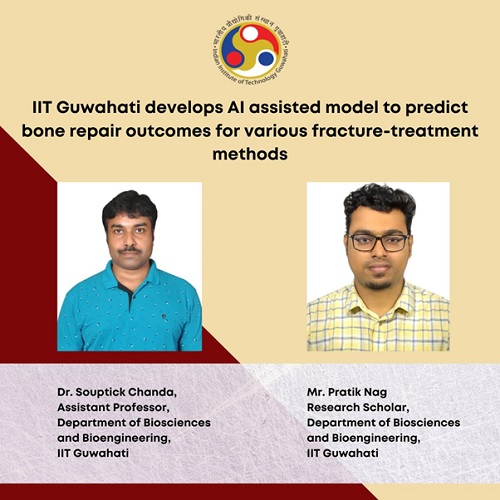
Telemedicine – News from India & Abroad
LifeHub+ App Links Patients, Doctors With Fitbit?
LifeHub+ app launched by telecom company StarHub links patients to their doctors with Fitbit data for better healthcare management.The LifeHub+ app provides two different ‘ConnectedCare’ plans to the patients– $9.99 monthly plan and $99.99 annual plan…Readmore
Are Smartwatch Health Apps Smart Enough?
Philadelphia, October 12, 2022 – Extended cardiac monitoring in patients and the use of implantable cardiovascular electronic devices can increase detection of atrial fibrillation (AF), but the devices have limitations including short battery life and lack of immediate feedback. Can new smartphone to…Readmore
Artificial Intelligence Helps Find Similar Cases, Diagnose Rare Diseases
A deep learning algorithm known as SISH (Self-Supervised Image search for Histology) teaches itself to learn features which can then be used to find similar cases in large pathology image repositories.The new machine learning tool acts like a search engine for pathology images and has many potential ….Readmore
Facemask can Detect Viral Exposure Within 10 Minutes?
Scientists have created a face mask that can detect common respiratory viruses, including influenza and the coronavirus, in the air in droplets or aerosols. The highly sensitive mask, presented September 19 in the journal Matter, can alert the wearers via their mobile devices within 10 minutes if …Readmore
Click here to Become a Member of Telemedicine Society of India
Telemedicine Practice Guidelines – A Foundation Course for RMPs by TSI Faculty
To know more about the Telemedicine Foundation Course click on the link below:
https://tsitn.org/tpg-course/
TN – TSI invites all the TSI Chapters and Members to submit information on their upcoming Webinar or Events (50 words), News related to Telemedicine (200 words) or short articles (500 words) for the monthly e-newsletter.Guidelines for submission to TN TSI Newsletter-
|
Submission may be sent to – tsigrouptn@gmail.com
Editors reserve the rights for accepting and publishing any submitted material.
Editor in Chief – Dr. Sunil Shroff
Editors – Dr. Senthil Tamilarasan & Dr. Sheila John
Technical Partner- https://www.medindia.net



